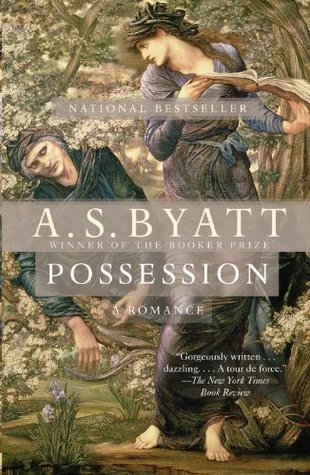More on this book
Community
Kindle Notes & Highlights
When a writer calls his work a Romance, it need hardly be observed that he wishes to claim a certain latitude, both as to its fashion and material, which he would not have felt himself entitled to assume, had he professed to be writing a Novel.
who kept the garden as bright and wholesome and well ordered as her living-room was sparse and decomposing.
All appealed to Miss LaMotte on the question of the rapping spirits; she declined to express an opinion, answering only with a Monna Lisa smile.
In his day, he said, students were grounded in spelling and had learned poetry and the Bible by heart. An odd phrase, “by heart,” he would add, as though poems were stored in the bloodstream. “ ‘Felt along the heart,’ as Wordsworth said,” Blackadder said.
He thought often, in his dim place, of how a man becomes his job. What would he be now if he had become, say, a civil servant allotting housing finance, or a policeman, poring over bits of hair and skin and thumbball prints? (This was a very Ash-like speculation.) What would knowledge be, collected for its own sake, for his own sake, that was, for James Blackadder, with no reference to the pickings, digestion and leavings of Randolph Henry Ash?
There were times when Blackadder allowed himself to see clearly that he would end his working life, that was to say his conscious thinking life, in this task, that all his thoughts would have been another man’s thoughts, all his work another man’s work. And then he thought it did not perhaps matter so greatly.
Paola smiled at him and Blackadder frowned.
He had a good ironic smile when he smiled, which was very infrequently.
“Isidore LaMotte.
They know what there is to find before they’ve seen it.
“Christabel LaMotte.
Virginia Woolf knew it, she adduced it as an image of the essential androgyny of the creative mind
One is Professor Leonora Stern, in Tallahassee. And the other is Dr Maud Bailey in Lincoln University.
Geometry threading water, catching light.
‘If you can order your Thoughts and shape them into Art, good: if you can live in the obligations and affections of Daily Life, good. But do not get into the habit of morbid Self-examination. Nothing so unfits a woman for producing good work, or for living usefully. The Lord will take care of the second of these—opportunities will be found. The first is a matter of Will.’ ”
touchstone.
he was an incurable optimist, and imagined a fortunate meeting around every corner, though how that should come about was hard to see, as he advanced farther and farther into the dark, dense trees, where even the moonlight was split into dull little needles of bluish light on the moss, not enough to see by.
After mortal trouble Let me lie still Where the wind drives and the clouds stream Over the hill Where grass’s thousand thirsty mouths Sup up their fill Of the slow dew and the sharp rain Of the mantling snow dissolv’d again At Heaven’s sweet will.
“The stones I shaped endure.”
MY EARLY LIFE
What is read and understood and contemplated and intellectually grasped is our own, madam, to live and work with.
Hoc opus, hic labor est.
There are indeed more things in heaven and earth than are dreamed of in our philosophy.
but through long and patient contemplation of the intricate workings of dead minds and live organisms, through wisdom that looks before and after, through the microscope and the spectroscope and not through the interrogation of earth-obsessed spectres and revenants.
I have written at such length because I do not wish you to think I take your kind thoughts of me frivolously or in a spirit of unthinking bellicose denigration, as some might say.
Ash always maintained, unlike many of his contemporaries, notably Professor Gabriele Rossetti, father of the poet, that Petrarch’s Laura and Dante’s Beatrice, along with Fiametta, Selvaggia, and other objects of Platonic courtly affection, were real live women, chaste but loved in the flesh, before their deaths, and not allegories of the politics of Italy, or the government of the Church, or even of their creators’ souls.
Jonathan liked this
“The Fountain Sealed” or “A Painted Lady,” with its image of beauty fixed forever on the canvas and fading in the face
“There are poets,” Beatrice wrote in her Finals paper, “whose love poems seem to be concerned neither with praise nor with blame of some distant lady, but with true conversation between men and women.
Reading those poems, she obscurely knew, offered her a painful and as it seemed illicit glimpse of a combination of civilised talk and raw passion which everyone must surely want, and yet which no one—as she looked round her small world, her serious Methodist parents, Mrs Bengtsson running her University Women’s Tea Club, her fellow-students agonising over invitations to dance and whist—no one seemed to have.
I hit on something I believe when I wrote that I meant to be a Poet and a Poem. It may be that this is the desire of all reading women, as opposed to reading men, who wish to be poets and heroes, but might see the inditing of poetry in our peaceful age, as a sufficiently heroic act. No one wishes a man to be a Poem.
There was something powerful about him, Pluto delivering Persephone at the gate of the underworld.
She waited. He took hold of her. It was will and calculation, not desire.
Letters, Roland discovered, are a form of narrative that envisages no outcome, no closure.
Letters tell no story, because they do not know, from line to line, where they are going.


